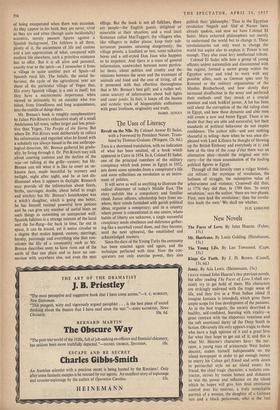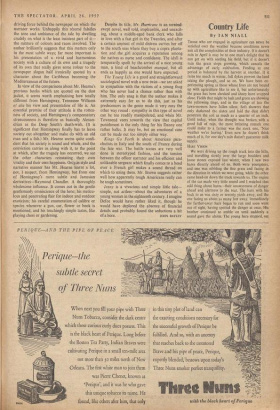New Novels
I HAVE missed John Hearne's two previous novels, but after reading The Faces of Love I shall cer- tainly try to get hold of them. His characters are strikingly endowed with the tragic sense of life, and they live in a West Indian island (I imagine Jamaica is intended), which gives them ample scope for free development of the passions. As in the best tragedy, the society described is healthy, self-confident, bursting with vitality—a great contrast with the stuporous vexations and the soft emotional decay of the Deep South in fiction. Obviously life only appears tragic to those who have a high opinion of it and a great love for what they hope to get out of it, and this is what Mr. Hearne's characters have : the nar- rator, a young man of aristocratic West Indian descent, makes himself indispensable on the island newspaper in order to get enough money to marry his Cuban girl friend and settle down in patriarchal style on an island estate; his friend, the chief tragic character, a mulatto con- tractor, strives by means honest and dishonest to win the power and influence on the island which he hopes will give him final emotional control over his mistress, a truly remarkable portrait of a woman, the daughter of a German tart and a black policeman, who' is the real
driving force behind the newspaper on which the narrator works. Unhappily this resume falsifies the tone and ambiance of the tale by dwelling crudely on what is the least insistent part of it— the mixture of colours and races involved. The author brilliantly suggests that this matters only in the most subtle ways; far more important is his presentation of a vivid and harmonious society with a culture of its own and a tragedy of its own that really gives some colour to the newspaper slogan half ironically quoted by a character about the Caribbean becoming the Mediterranean of the future.
In view of the comparisons about Mr. Hearne's previous books which are quoted on the dust jacket, it seems worth emphasising how totally different from Hemingway, Tennessee Williams et alia his view and presentation of life is. An essential premise of their attitude is the rotten- ness of society, and Hemingway's compensatory strenuousness is therefore as basically Alexan- drian as the Deep South's death-wish. (It is significant that Hemingway finally has to leave society out altogether and make do with an old man and a fish.) Mr. Hearne seems quite confi- dent that his society is sound and whole, and the conviction carries us along with it, to the point at which, after the tragedy has occurred, we see the other characters reinstating their own vitality and their own happiness. Onlyin style and narrative manner has Mr. ,Hearne learnt a lot, not, I suspect, from Hemingway, but from one of Hemingway's more subtle and Jamesian derivatives—Raymond Chandler. A thoroughly
wholesome influence. comes out in the gentle gentlemanly omniscience of the hero; his meticu- lous and penetrating flair for indoor and outdoor exoticism; his careful enumeration of calibre or species whenever a gun, car, flower or book is mentioned; and his touchingly simple tastes, like playing chess or gardening.
Despite its title, Mr. Hurricane is an unwind- swept novel, well told, implausible, and unexcit- ing, about a middle-aged bank clerk who falls in love with a fast girl in the Twenties, and after a certain amount of mild distress carries her off to the south seas where they buy a copra planta- tion and the .girl acquires a reputation among the natives as nurse and confidante. The idyll is temporarily spoilt by the arrival of a nice young man, a kind of beachcomber manqué, but all ends as happily as one would have expected.
The Young Life is a good and straightforward sociological novel with a new twist—we are asked to sympathise with the victims of a young thug who has never had a chance rather than with him. The only snag is that the author makes it extremely easy for us to do this, just as his predecessors in the genre made it very easy the other way round : sympathy in this type of novel can be too readily manipulated, and when Mr. Townsend veers towards the view that capital punishment is the only thing for his Danny one" rather balks. It may be, but an emotional case can be made out too simply either way.
Kings Go Forth is about American para- chutists in Italy and the south of France during the late war. The battle scenes are very well done in stereotyped fashion, and the tension between the officer narrator and his efficient and unlikeable sergeant which finally comes to a head over a French girl makes a sound thread on which to string them. Mr. Brown suggests rather well how apparently tough Americans really can be tough sometimes.
Jenny is a vivacious and simple little tale— simple, not artless—about the adventures of a young woman in the eighteenth century. I imagine Defoe would have rather liked it, though he would have deplored the absence of financial details and probably found the seductions a bit































 Previous page
Previous page